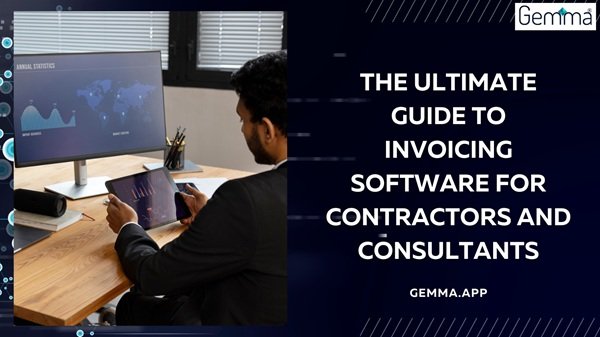The Ultimate Guide to Invoicing Software for Contractors and Consultants

Every project-based business needs structure, especially when it comes to finances. Whether you’re an architect, engineer, consultant, or part of a creative or sustainability-focused agency, managing quotes, invoices, expenses, and time needs more than spreadsheets. You need tools that match the way you work—like powerful invoice billing software or contracting and invoicing software designed for service businesses. That is where client accounting software comes in.
This guide explains what it is, the types of accounting software available, and how to pick the best invoicing software for consultants, contractors, or any small project-based firm.
Understanding the Role of Client Accounting Software
Client accounting software helps service businesses stay financially organised. It tracks client jobs, manages invoices, records expenses, and links all of this back to each project. Whether you’re using invoicing software for a small business or an automated billing software solution, visibility across quotes, job stages, and expenses is essential.
You can see what has been billed, what is outstanding, what has been quoted but not approved, and how each job is performing financially.
In project-based work, you don’t deal with inventory—you deal with deliverables, scope changes, and time entries. A good tool needs to follow that structure. If your software can’t show gross profit by project or doesn’t link expenses and time to job codes, you will spend more time guessing than knowing.
Systems like Gemma are designed with project flow at their core. Jobs are not just tagged—they drive everything from invoicing to approval tracking, profitability reporting, and even online payment for consultants.
Core Types of Accounting Software (With Use Cases)
Different businesses need different tools. Here is a look at the three most common types of business accounting software used in Australian service firms:
| Type | Best For | Key Features |
| Entry-level tools | Sole traders or Sole traders or freelancers freelancers | Manual invoicing, limited reporting |
| Business accounting software | Small to mid-sized firms | Automated invoicing, expense tracking, and BAS reports |
| Client accounting software | Project-based teams with repeat clients | Job-costing, time integration, multi-client dashboards |
Entry-level tools are often spreadsheet-based or basic invoicing platforms. They work when you have one or two clients and simple billing. These tools may be suitable for invoicing software for contractors, but they often lack real-time data and job-level reporting capabilities.
Business accounting software is a step up. It handles tax reporting, payroll, and recurring invoices—ideal for those seeking the best billing and invoicing software that scales with business growth.
Client accounting software, however, is built for project-heavy service firms. It supports service-based billing, job costing, time tracking, and integrations with online payment software—making it the best invoicing software for consultants and project teams alike.
Key Features That Make a Difference
A long feature list looks nice, but most service businesses need a few core functions:
- Live invoicing with pre-filled project data using invoice billing software
- Time and expense tracking that syncs directly to jobs
- Job costing based on actuals, not estimates
- Quote-to-invoice conversion with full context
- GST and BAS-ready reports for compliance
Tools like Gemma automate time entry capture and tie expenses to the correct job. This makes it a leading contracting tool for consultants, offering both clarity and accuracy. You’re not relying on memory—you’re running off real-time data.
Choosing Software That Matches Your Business Model
The best invoicing software for consultants and contractors is one that matches your business model. Ask yourself:
- Do you bill by milestone, phase, or service type?
- Do your jobs shift based on client feedback or regulation?
- Do team members need mobile access for field entries?
- Do you need automated billing software with flexible approval flows?
If yes, then you need more than off-the-shelf solutions. You need smart contracting and invoicing software, like Gemma, that accurately reflects how projects work in the field.
Common Mistakes to Avoid When Picking Software
Don’t get caught by these common missteps:
- Choosing tools focused on inventory when you sell services
- Skipping tools that support business management software integration
- Overlooking mobile entry support and usability
- Not considering support for online payment for consultants
- Ignoring project-level reporting and scope tracking
Your accounting software should serve everyone—PMs, admins, bookkeepers, and your external accountant—without confusion or bottlenecks.
Real Benefits You Will Notice in the First Few Months
- With the right invoice billing software and invoicing software for small business, you’ll quickly notice:
- Fewer questions from your accountant
- Fewer time and entry errors from staff
- Clear per-job profitability
- Less admin chasing time sheets and receipts
- Improved cash flow management
- Accurate reporting, even during scope changes
Where Simplicity Meets Control!
Running a service business is complex enough without clunky software slowing you down. If you’re juggling timelines, scope, and budgets across multiple projects, clarity is essential.
With the right contracting and invoicing software, your data becomes actionable. Your team gains time. Your clients get accurate, transparent invoices. And your accountant gets everything they need—on time.
Gemma isn’t just a tool—it’s a smarter way to run your service business.





